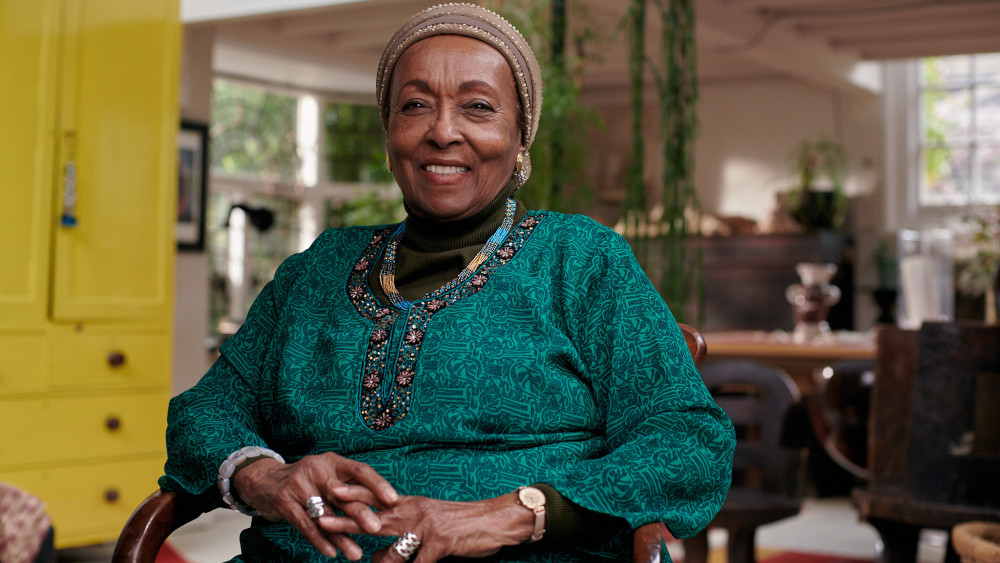
2023 Templeton Prize winner Edna Adan Ismail in London. Templeton Prize photo by Tim Cole
When Edna Adan Ismail, the winner of the 2023 Templeton Prize, began working as a nurse and midwife in 1960s Somalia, she was horrified by the pain and medical complications she saw in patients who’d experienced female genital mutilation.
Her indignation simmered until 1976, when as director of Somalia’s Ministry of Health, she attended a health conference in Sudan where, for the first time, she heard Muslim believers openly condemn FGM.
That message changed everything for Ismail.
"I doubt I would have had the courage or the ability to speak out against FGM if I had not trained as a nurse and if I had not heard from the medical doctor in the Sudan and from the Muslim congregation attending the health conference in Khartoum that FGM was against the teachings of Islam," Ismail, 85, said in an email to Religion News Service.
Decades later, Ismail is known as a fierce advocate who condemns FGM because of, not despite, her Muslim faith. Ismail is also founder of the Edna Adan University and Edna Adan Hospital, which has reduced the maternal mortality rate in Somaliland by up to 75%.
The Templeton Prize, which comes with an award of 1.1 million British pounds (more than $1.3 million), was established by the late investor and philanthropist Sir John Templeton to honor individuals who use scientific advancements to answer the deepest questions related to humanity’s existence and purpose.
Ismail is the third Muslim, fifth woman and first African woman to receive the prize since its launch in 1973. This award is believed to be the largest international prize won by an individual African woman, according to the Templeton Foundation.
"We are delighted to honor Edna Adan Ismail, a woman who has used the teachings of her faith, the influence of her family, and her education in science to improve the health and opportunities of some of the world’s most vulnerable women and girls," Heather Templeton Dill, president of the John Templeton Foundation, said in a press release.
Ismail was born in 1937 to an influential, interfaith family in then-British Somaliland. Her mother was a devout Catholic, and her father, a Muslim and prominent doctor, ensured she received a covert education alongside her brother.
Though she was initially interested in surgery, Ismail’s father encouraged her to pursue midwifery, a vocation she quickly embraced. "When you follow that pregnancy from nothing for months, and you hear that heartbeat, you hear a life inside another human being, and to hear it cry and breathe, that’s when you feel the power of God," Ismail said.
Advertisement
Ismail has been credited with many "firsts" — she’s known as the first Somali woman to have Western nursing training, to have a driver’s license and to hold political authority. It was during her stint as director of Ministry of Health in Somalia that Ismail became emboldened to tackle FGM, a topic that was often taboo, even in the clinical setting.
Though the medical risks associated with FGM are central to her campaign against it, the issue is also deeply personal for Ismail. When she was 8 years old, her mother subjected her to the operation while her father was out of town. When he returned, he was outraged. "My father’s anger when he found out that I had been cut during his absence from town that day convinced me that what had been done to me was wrong," she told RNS.
When Ismail began publicly opposing FGM in the mid-’70s, she discovered that the act was contrary to the teachings of all the world’s religions, including Islam. But not everyone agreed. She received threats, and even family members told her to drop the issue, which they saw as "indecent." But Ismail continued to champion the cause. When civil war broke out in Somalia in the 1980s, she became an adviser at the World Health Organization and was pivotal to bringing about the criminalization of FGM in Djibouti.
After a re-formed Somaliland declared independence in 1991 (though it has not gained international recognition), Ismail traded her career for the chance to build a hospital in her homeland, where health services had been demolished during the war.
Ismail sold her assets and raised outside funds to launch the Edna Adan Maternity Hospital in 2002, built on the site of a former dump and execution ground donated by the government. Edna Adan University, which has trained more than 4,000 health care workers and public health professionals now serving communities throughout East Africa, was added in 2010. Seventy percent of the university’s student body and 80% of the hospital staff are female.
Practitioners at the hospital are still fighting against FGM, which has been performed on more than 200 million women and girls alive today, caring for patients and distributing educational materials to locals and religious leaders. Ismail insists that all people, not just women, must stand against FGM and has urged religious leaders to recognize the urgency of the issue.
"Religious leaders need to take a stronger position and have a louder voice to protect little girls from cruel bodily harm and from pain and unnecessary suffering," she told RNS.
With the Templeton Prize money, Ismail said she will make a "major contribution" to fund the purchase of medical equipment, the hiring of experts and an expansion at the hospital. She will deliver the Templeton Prize lecture in London this fall. Among the 52 prize recipients are Archbishop Desmond Tutu, Mother Teresa, Francis Collins and Billy Graham.
Going forward, Ismail told RNS she hopes the university and hospital established in her name will outlive her. Her dream is for it to serve all who need it, especially the poor, and that it "will continue to function and flourish without me and beyond my life."




